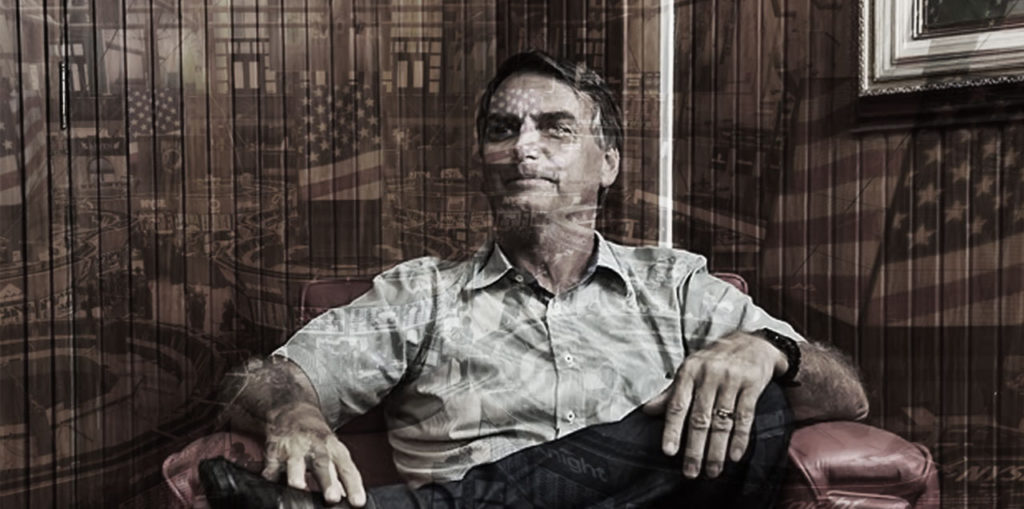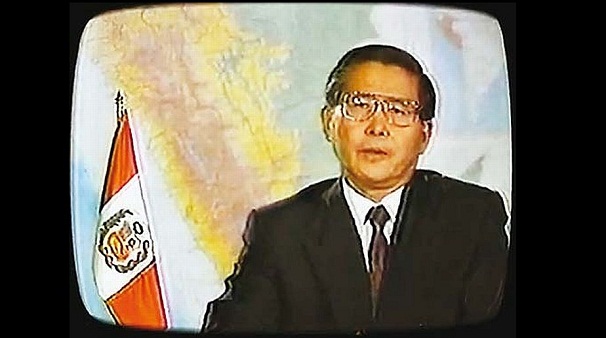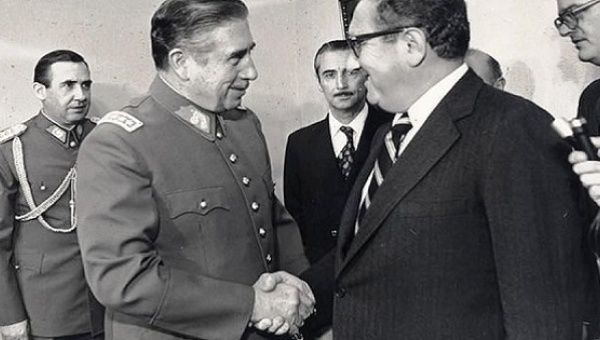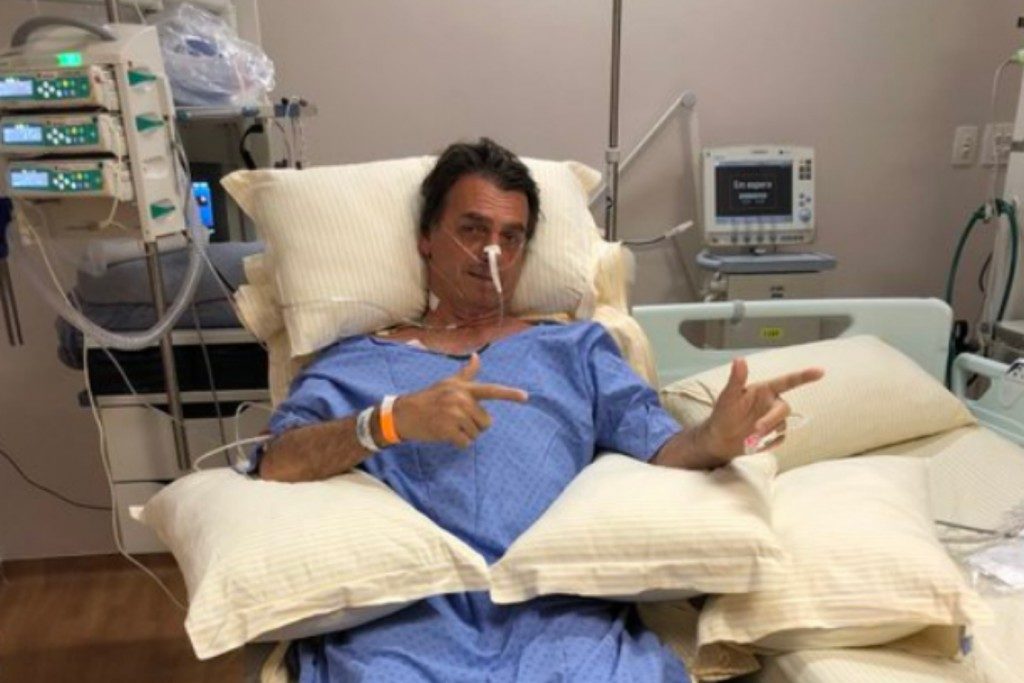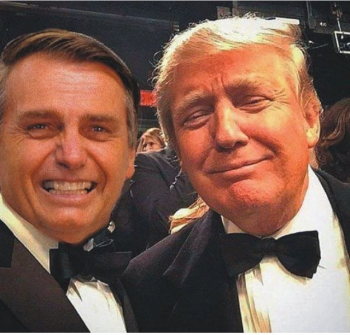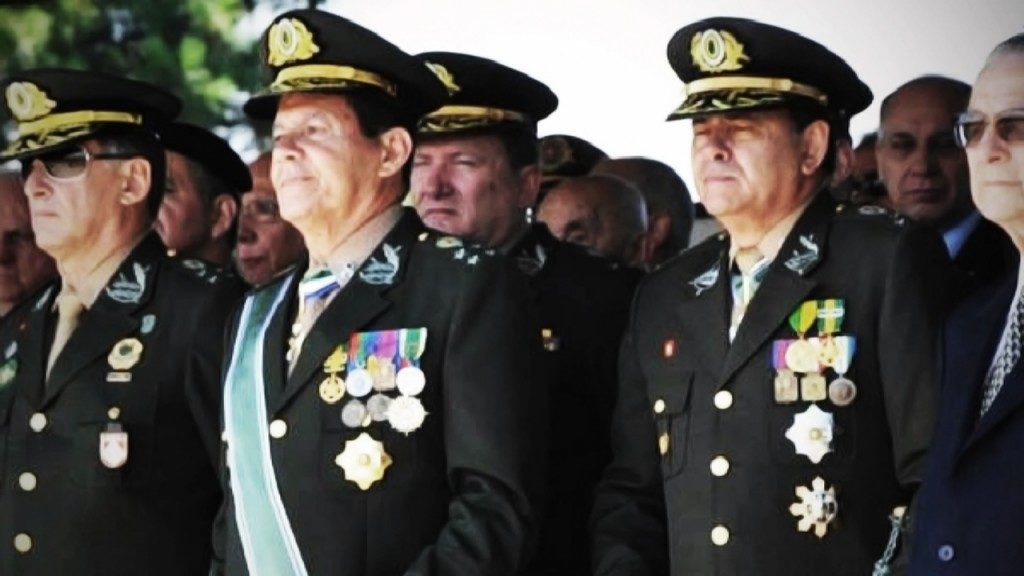“Pinochet via Fujimori”: Wall Street’s New Man in Brazil, Jair Bolsonaro
ANGLO AMERICA, BRICS, LATIN AMERICA AND THE CARIBBEAN, CAPITALISM, 15 Oct 2018
Brasil Wire - TRANSCEND Media Service
“No room for feelings” say Wall Street insiders as they back another Neofascist to deliver Neoliberalism, at the point of a gun, in the most resource-rich nation on earth.
New York Times, July 1993. In an article called “Conversations/Jair Bolsonaro; A Soldier Turned Politician Wants To Give Brazil Back to Army Rule“, Journalist James Brooke interviewed a 38 year old congressman. Brazil was struggling, a President gone, in the third year of directly elected Government since the coup of 1964, and the already infamous former Army Captain Bolsonaro was proposing a return to Military Rule.
This may have sounded outlandish, but just 4 years previously, declassified documents reveal that if the 1989 election had not gone the right way, Brazil’s Military establishment and the United States already had contingency plans for another Coup to set things right. It is safe to assume that a Latin American politician featured in the New York Times is already on the US Government’s radar.
Brooke wrote: Applying to politics the boldness he once displayed as an army parachutist, Congressman Jair Bolsonaro plunged into uncharted territory a few weeks ago when he strode to the podium of Brazil’s Chamber of Deputies and called for the closing of Congress. “I am in favor of a dictatorship,” he bellowed in a speech that rattled a country that only left military rule behind in 1985. “We will never resolve serious national problems with this irresponsible democracy.”
“Everywhere I go, people embrace me and treat me like a national hero,” Mr. Bolsonaro asserted. “The people in the streets are asking for the return of the military. They ask, ‘When are you coming back?’ “
But to many defenders of Brazilian democracy, the Bolsonaro phenomenon represents a flashing yellow light — a sign that people are growing impatient with democracy’s failure to curb inflation and deliver a better style of life, and a warning that politicians on the authoritarian right are eager to take advantage of this mood, and to cultivate it. The Fujimori Model. Today a new and less odious model for Latin American authoritarianism has emerged in Peru’s President, Alberto K. Fujimori. Faced with congressional deadlock last year, Mr. Fujimori, a civilian, ordered the Peruvian Army to close the country’s Congress and its courts. One year later, Mr. Fujimori rules with a compliant, one-chamber Congress.
During the interview, Bolsonaro was enthusiastic about the strategy of Fujimori, and even then, 25 years ago, was lauding political corruption as the element that would enable a return to military rule:
“I sympathize with Fujimori,” the Brazilian congressman continued. “Fujimorization is the way out for Brazil. I am making these warnings because the population is in favor of surgery.” Political surgery, Mr. Bolsonaro continued, would involve closing Congress for a defined period of time and allowing Brazil’s President to rule by decree. The justification for a such a constitutional break, he said, would be “political corruption” and Brazil’s inflation, which is now running at 30 percent a month. With Congress often deadlocked in battles among its 21 parties, Brazil’s press has displayed an increasing fascination with the Fujimori model. In the last month, Brazilian newspapers, magazines and television news programs have carried long interviews with the Peruvian leader. “Fujimori put 400,000 civil servants in the street,” Mr. Bolsonaro asserted. “How could we ever do that here?”
The congressman was equally enthusiastic about the wave of Neoliberal Privatisations then sweeping the region and the world:
When it held power in the 1960’s and 1970’s, the Brazilian military vastly expanded Brazil’s state sector, implanting a welter of state-run companies and monopolies. Today, Mr. Bolsonaro said, the leaders of the armed forces favor bringing the state back to basics: defense, education and health. “I vote for every privatization bill that I can,” Mr. Bolsonaro said. “It is the left that opposes privatization. They just want to preserve their government jobs.”
25 years later, Jair Bolsonaro is second placed in the Presidential polls. He lies in a hospital bed, connected to all manner of tubes and devices, after suffering an apparent assassination attempt.
New Normal
The weather vane for gauging opinion in the corridors of power is anglo corporate media. In 2017 came the first public signs that Jair Bolsonaro was becoming acceptable to investors, and what followed was a concerted attempt to normalise his candidacy.
For a long time he looked like an anti-establishment outlier, yet has been part of their armoury for years – break glass in case of emergency.
Bolsonaro has never been “Brazil’s Trump” as some foreign media have depicted over the past year. Despite he and his supporters’ protestations he is an actual fascist, former Military and unlike the US President, is far from being a billionaire, nor reality TV host.
It should be emphasised however that the depiction of the Bolsonaros as “outsiders” is wide of the mark. Jair has been a federal deputy for 27 years, his sons Eduardo, a federal deputy since 2015, Flávio, a state deputy since 2010, and Carlos, a city councillor since 2000. The family has 13 apartments worth R$15 million, and a summer house in Angra dos Reis. Jair and Eduardo pocketed over R$ 700,000 in housing allowance despite having two apartments in Brasilia. Jair’s estate alone is worth R$2.3 million. Eduardo’s personal estate grew by 432% between 2014-2018.
In articles such as this one in Rupert Murdoch’s Wall Street Journal and this one on the BBC, his normalisation accelerated through 2018. “Outspoken comments”, “Arch-Conservative”, “Law and Order campaigner”, “Hardline candidate” have been the kind of euphemisms used for Bolsonaro’s Neofascist politics.
Human Rights dominate narratives on foreign governments when it suits, but Israel and Saudi Arabia are clear examples of how easily such rhetoric is disregarded when it is in North Atlantic interests to turn a blind eye. His public remarks from anyone else, god forbid a leader like Venezuela’s Maduro, would draw unanimous condemnation. Somehow they’re now acceptable coming from a politician who promises to let capital run free.
In the 1990s US Oil giant UNOCOL (Now Chevron) decided after negotiations to back the Taliban regime in Afghanistan. Girls being banned from school was something they could live with. More recently the US and its allies had no qualms whatsoever about backing Neo-Nazis in Ukraine.
And throughout Pinochet’s reign of terror in Chile, and since, horrific crimes were relativised, diminished and ignored on account of his economic policy – the creation of a Neoliberal laboratory in the country, a glorious experiment in which thousands were disappeared, tortured and killed.
Never underestimate the levels of human suffering that “Wall Street”, and those whom blithely serve its interests, are prepared to accept.
Blood Waltz
On September 4, speaking at a campaign rally in Acre, an excited Bolsonaro called for the machine gunning of Workers Party members.
Brazilian Prosecutor General Raquel Dodge deemed that no crime had been committed, and that no harm had been done.
Two days later, whilst being carried on the shoulders of supporters through the city of Juiz da Fora in the state of Minas Gerais, an assailant approached the Presidential Candidate and plunged a knife into his abdomen. Although initially reported as a surface wound and not a threat to his life, he arrived at hospital with, according to his son, “40% blood loss” and multiple injuries to his intestines, liver and other organs. Some of these claims were later debunked.
His attacker Adelio Bispo de Oliveira was immediately depicted by Bolsonaro allies as a Worker’s Party militant. The rumour spread quickly, and risked sparking retaliatory attacks. Coup loyalist newspaper Estadão emphased that he described himself as “moderate left”, effectively a euphemism for the PT. It was also reported that between 2007-2014 he had been affiliated to the PSOL party, who immediately denounced the attack as did all the other candidates and parties.
Dilma Rousseff was less sympathetic in her response, remarking “When you plant hatred, you harvest the storm”. Given that in 2015 he publicly expressed hope that she die of an heart attack or cancer, and dedicated his vote for her impeachment to her torturer, it was surprising that her response generated any controversy at all.
The attack amplified fears of a wider demonisation of the left in general, which always spikes at election time. In 1989, just prior to the election, businessman Albinio Diniz was kidnapped, which was blamed on Lula’s Workers Party. The timing of the kidnapping so soon before the election meant that the PT could not respond to the accusation through the media, due to a compulsory ban on campaigning for the final 24 hours ahead of voting. Lula would lose the election to Fernando Collor.
Bolsonaro’s vice, General Mourão, reacted to the attack with a chilling: “If you want to use violence, we are the professionals of violence.” while Gustavo Bebianno, leader of the PSL, the “Social Liberal Party” to which Bolsonaro belongs, said simply “now it is war”.
In a video from his hospital bed Bolsonaro whimpered, “I’ve never hurt anyone”. In the first photo of the Presidential candidate conscious since arriving for treatment at São Paulo’s Albert Einstein Hospital he made his trademark “Two Gun” hand gesture.
His son Flavió posted on social media: “A message for these thugs who tried to ruin the life of a guy who is the father of a family, who is the hope for all Brazilians: you just elected the president, it will be in the first round”.
In a country where candidates and top government officials have been known to die in plane crashes at key moments in the political conjuncture, where a President elect suddenly died before taking office, and where the leading candidate has been jailed with no material evidence, people do not necessarily believe what they see on the news. The fact that Bolsonaro met with the owner of Globo, the largest media conglomerate in Latin America, 2 days before the knife attack, and that the video footage shows no blood, has led a large percentage of the Brazilian population to conclude that the incident was simulated or exaggerated to some extent. Regardless of whether this is the case or not, and we may never know, the fact is that Globo has used the incident to alter its portrayal of Bolsonaro from an right wing fringe outlier to a hero – even a martyr, during the 15 minutes of airtime they gave to the knife attack.
Wall Street was watching, and there was a sharp rise in the Real against the Dollar as news broke of an attack which was immediately interpreted as increasing his chances of election. On September 10, White House spokeswoman Sarah Sanders confirmed that members of the Trump administration had “reached out” to Bolsonaro.
In Plain Sight
A watershed moment for Bolsonaro came just one day before his stabbing, on September 5 2018, and was quickly forgotten in its wake.
It was a column for Folha do São Paulo by Brian Winter, editor of Americas Quaterly, the magazine of Wall Street lobby and think tank AS/COA (Americas Society/Council of the Americas). COA’s main patron is Chevron, but the corporate membership is a who’s who of US Corporations, Banks and Investment funds. A bridge between corporate, government power, intelligence, regional leaders and business, its purpose is to influence the Latin American politics in the interests of its members. In 2016, at an AS/COA event, post-coup President Michel Temer admitted that Dilma Rousseff had been impeached because she refused to implement their extreme Neoliberal programme “Bridge to the future”. The document was odd in that it appeared to have been translated from English, with social media users remarking on its unusual wording. Economist Marcio Pochmann noted similarities between “Bridge to the Future” and the “Government Economic Action Plan” (PAEG) which followed the Coup of 1964. One such similarity, he says, is the strong international influence.
The column in Folha do São Paulo openly admitted for the first time, for a wealthy Paulista readership, that Wall Street now supported the Presidential Candidacy of Jair Bolsonaro. And this was from the horses mouth, as “Wall Street” in effect equals the membership of the Council of the Americas, the actual organisation for which the author works.
Winter wrote: “There is, finally, the moral element. How can investors support a candidate with positions such as those of Bolsonaro on women, minorities and human rights? That’s the easy question. I know many honest people on Wall Street who feel repulsed by Bolsonaro. But they admit in private conversations that there is no room for feeling. As one told me, “my job is to make sure the bonds get paid on time. As for the rest-it’s up to the Brazilians to decide.”
For those familiar with the history of AS/COA, the handwringing tone of the column should have come as no surprise. Pulitzer winning investigative journalist Seymour Hersh wrote about it in his book “Price of Power“, detailing its role in the build up to the 1973 Chilean coup which left Salvador Allende dead and brought Augusto Pinochet to power.
“Millions of dollars in (US)AID and CIA funds were allocated, with the full knowledge of the Chilean and United States governments, to Roman Catholic organizations throughout the country whose objective was to oppose Protestantism and communism. Frei won handily, with 56 percent of the vote. Frei, who was fully aware of the source of his funding, also received covert help from a group of American corporations known as the Business Group for Latin America. The Group had been organized in 1963 by David Rockefeller, president of the Chase Manhattan Bank, at the express request of President Kennedy, who was directing his administration’s fight against Castro and the spread of communism in Latin America. It included on its executive committee such prominent corporation executives as C. Jay Parkinson, board chairman of Anaconda; Harold S. Geneen, head of the International Telephone and Telegraph Corporation, which owned and operated the telephone facilities in Chile; and Donald M. Kendall, chairman of PepsiCo, the softdrink company, which had extensive business activities in Latin America.
The principal contact in Chile for the CIA as well as for the American corporations was the organization of Agustín Edwards, a close friend of Kendall’s, who was the owner of the conservative El Mercurio newspaper chain in Chile and a focal point for the opposition to Allende and the left. The CIA and the Business Group, which by 1970 had been reorganized into the Council of the Americas, relied heavily on Edwards to use his organization and his contacts to channel their moneys into the 1964 political campaign. Many of the ties between the Business Group and the CIA in 1964 remained in place long after the election. For example, Enno Hobbing, a CIA official who had initially been assigned as liaison to the Business Group, eventually left the CIA and became the principal operations officer for the Council.”
David Rockefeller remained at its head until his death in 2017. Other notable staff include former Deputy US Secretary of State, first Director of National Intelligence, key plotter in Venezuela’s failed 2002 Coup and overseer of war crimes in Central America, John D. Negroponte, and Juliana Barbassa, who now works at the New York Times Latin America desk.
Interference in Brazil’s election, and fomenting support for the subsequent coup of 1964 were amongst the nascent COA’s first tasks. Rockefeller told a meeting at West Point in late 1964 that “the banking community had decided early on that João Goulart was not acceptable and that he had to go”. It had funded Brazilian Institute for Democratic Action (IBAD) and a related organisation called Democratic Action (ADEP) spending between 12-20 million dollars (2018: up to $165m) financing anti-Goulart/anti-Communist candidates during the 1962 electoral campaign.
In 2005 a new think tank was formed drawing together Neoliberals from Brazil and outside, including journalists, economists and politicians, that was called a successor organisation to IBAD. Over the next decade its alumni would come to dominate the economic media narrative in Brazil. It was called Instituto Millenium, and its founder a Brazilian Banker called Paulo Guedes.
Bolsonaro’s “Brain”
AS/COA held at least one off record meeting with Bolsonaro and his advisors in 2017. What followed was a road to Damascus style conversion to the public rhetoric of free markets and the minimal state. Yet, whereas prior he had been depicted as a some kind of economic nationalist, it was clear as early as the 1993 New York Times interview, that he was always staunchly pro-privatisation.
Despite this long held commitment to free-markets, he admitted publicly in a TV Interview with Mariana Godoy that he doesn’t understand anything about economics, and that’s where his “guru” Paulo Guedes comes in.
Wall Street investors see the Bolsonaro/Guedes combination like Pinochet and the Chicago Boys. Neoliberalism at the point of a gun.
Guedes was a founder of what became BTG Pactual bank, and actually worked in Chile under Pinochet. He describes his genocidal dictatorship as “an intellectual point of view”. Wall Street Journal and others have openly defended Pinochet, and in 2015, Winter himself described the Dictator as a “Revolutionary” and equated him with Che Guevara.
Since becoming part of Bolsonaro’s team in 2017, named as his prospective Finance Minister Guedes has described the former Soldier as the representative of an abandoned Brazilian middle class, and they have worked to consolidate support amongst the Bullet, Bible & Bull congressional caucus, with a promise of carte blanche for the farming industry’s violence against Indigenous communities and Social Movements. With a nod to extractive multinationals he said “where there is indigenous land, there is wealth beneath it“.
In 2017 Guedes embarked on an international mission to improve Bolsonaro’s image with investors and foreign media. It appeared to have some effect, as this April 2018 Bloomberg article shows.
He openly supports torture and his congressional vote for Dilma Rousseff’s impeachment was marked by a demented eulogy to the man, Carlos Brilhante Ustra, responsible for her brutal and sexual torture in the early 1970s. He has twice made rape-related threats and remarks to PT Congresswoman Maria do Rosario, for which he was convicted. He has made racist remarks at public events for which he has been convicted. He is an outspoken homophobe, denier and apologist for violence and murder of LGBTQ Brazilians. He has said that “30,000 Brazilians needed to be killed for the country to function”.
Yet in the eyes of Wall Street, he is preferable to a Social Democrat.
At the point of a gun
Early in 2018 it was was reported that, at an event of Guedes’ BTG Pactual Bank, Bolsonaro proposed a solution to organised crime in Brazil’s favelas, such as Rio de Janeiro’s Rocinha, home to around 70,000 inhabitants. It was to drop leaflets from helicopter, warning citizens to evacuate and the gangs that they had four hours to surrender. After some hours the favelas should be machine gunned. He was also reportedly applauded by the audience, made up of the banking and business community.
Previously the candidate has said on television that Chile’s Augusto Pinochet did what he had to do, but “didn’t go far enough” and in early September 2018, his son and fellow congressman Eduardo tweeted (then deleted) that “We will change Brazil with or without bullets”. He was recently photographed with new advisor, white supremacist Steve Bannon.
Back in 2014, from a sound truck shared with Koch Brothers-linked pro-coup group MBL, son Eduardo addressed the small crowd at one of the first protests following the re-election of Dilma Rousseff, with a pistol in his belt, demonised “communists” and eulogised the Military Police. He has since proposed a law that would make “apologia for communism” a criminal offence.
His father Jair once said that he “would call a military coup on the day he was elected”, and doubled down on this by appointing General Mourão, as his Presidential running mate. With Bolsonaro in hospital, it is Mourão, who openly expresses his belief in Brazil’s return to military rule, who now takes centre stage in the campaign.
During a interview before a panel of journalists on Globo News, Mourão remarked “Heroes kill” when asked about the actions of Carlos Brilhante Ustra, head of the feared internal intelligence agency DOI-CODI during the military regime, the man personally responsible for the torture of Dilma Rousseff.
With Mourao’s rhetoric people are yet more afraid their campaign could be an attempt to induce military rule through a charade at the ballot box, with the clear leader in jail and prevented from running. The unearthing of Bolsonaro’s 1993 quotes in the NYT raised the spectre of a “Fujimorian Auto-Coup” and Mourão comes from the school of thought that the Dictatorship should have never ended.
Authoritarian Coup-loyalist and Supreme Court Judge Alexandre de Moraes, who was appointed following the controversial death of Judge Teori Zavascki in early 2017, is overseeing Bolsonaro’s conviction for racism, and by not acting to sentence him before the election is accused of maintaining Bolsonaro’s freedom and election prospects – effectively kept as an establishment “plan B” in case his former boss Geraldo Alckmin didn’t progress to the second round – which now looks highly unlikely.
Patriots
Filmed on a trip to Miami in 2017 saluting the United States flag, it was not the first time that Bolsonaro’s “nationalist” credentials had been tested.
On July 9 2013, the country was still gripped by mass protests that appeared to spring from nowhere. Just prior to the explosion on the streets, whistleblower Edward Snowden released documents showing United States surveillance of Brazilian Government, Law Enforcement and Strategic Companies. In congress that day, Bolsonaro all but dismissed the revelations. He was joined by PSDB’s Nilson Leitão, Ronaldo Caiado, of key 2016 coup player and Dictatorship-heir party Democratas, and their future Congressional President Rodrigo Maia.
The minutes of that Congressional session in Brasília report that:
“The Plenary approved, by 292 votes to 86 and 12 abstentions, a motion proposed by the PT and signed by the leaders of the PMDB, the PV, the PSOL and the PCdoB to repudiate the US government for the espionage of US intelligence agencies on companies and people.
Deputies stressed that the motion is a response to the gravity of the allegations made by former CIA technician Edward Snowden, that the National Security Agency (NSA) maintained offices in Brazil to monitor the communication of companies and Brazilians.
“It is a manifestation of the Legislature, which can not be omitted, it is not a diversionary maneuver, but the position of Parliament,” said the leader of the PV, Deputy Sarney Filho (Maranhão). This was reinforced by the leader of PSOL, Deputy Ivan Valente (São Paulo).
The proposal for a motion of repudiation led to divergences in the Plenary. Deputy Jair Bolsonaro (PP-RJ) said the attitude is premature and stressed that the US is a major trading partner. The leaders of the minority, Nilson Leitão (PSDB-Mato Grosso); Ronaldo Caiado (DEM-Goiania); and deputy Rodrigo Maia (DEM-Rio de Janeiro), denounced that the motion aims to divert the focus of the problems in the country.“
It is a historical curiosity that such a staggering and unprecedented level of US spying on Brazil – a friendly nation – as written about here by Glenn Greenwald, and quickly identified as a fundamental sovereignty issue on the left, was dismissed entirely by far right politicians such as Bolsonaro and Caiado.
God & Brazil above all
Bolsonaro’s 2018 campaign manifesto, created in conjunction with Paulo Guedes, is called “Project Phoenix”. Public security and liberalisation of Gun ownership take centre stage, but it is also explicitly in favour of the process which has seen privatisation of Brazil’s state owned companies and resources further opened to foreign ownership. He also proposes military style schooling, and censorship of “leftist” ideology from classrooms.
Meanwhile, in contradiction of the beliefs held by his core support, the manifesto also reaches out to Brazil’s poorest by insisting it will retain key social programme Bolsa Familia.
It also contains dozens of references to God. His support amongst Neopentecostal, Evangelical congregations is strong. (The early growth of such groups as a powerful, imported, socially conservative force in Brazilian society is documented in William Colby and Catherine Dennett’s ‘Thy Will Be Done’).
The same voices who normalise Bolsonaro now have breathlessly promoted the “pro-market” Car Wash anti-corruption operation for the past 4 years, which has drawn an official UNHRC rebuke for its imprisonment of the leading candidate in October’s elections, former President Lula da Silva. The Human Rights committee issued an order, under a treaty that is binding under Brazilian law, that Lula must be allowed to run for President, and have access to his party and media. All of these requests were denied, putting Brazil in breach of its international human rights commitments.
For Bolsonaro and his supporters, the very notion of Human Rights is “communist”. He has promised to withdraw Brazil from the UN, if elected and abandon Brazil’s Human Rights ministry.
It had long been clear that the Military would not accept a Lula candidacy, and 9th September this was made all but official by head of the armed forces General Villas-Boas, which brought instant condemnation from the Workers Party.
Jair Bolsonaro is a case-study in the relationship between Fascism and Neoliberalism.
It is critical for the outside world to understand that this new-look, market-friendly Bolsonaro is only in a position where victory is even theoretically possible because, and only because, of former President Lula’s contested imprisonment. That imprisonment has been aided through informal (and illegal) collaboration between the US Department of Justice and Brazilian Federal Police, discussion of which is an Anglo media taboo.
The first polls conducted after his attack showed only a very slight increase in voting intention, but he has steadily grown since. Thankfully he has massive public rejection, and there will be an enormous mobilisation to stop him.
If investors truly believe that a Fascist’s victory in such an obvious sham of an election would protect their assets, they massively underestimate the Brazilian people, and should think again. If, somehow Jair Bolsonaro is elected President of Brazil, we should be under no illusion – there will be blood.
Go to Original – brasilwire.com
DISCLAIMER: The statements, views and opinions expressed in pieces republished here are solely those of the authors and do not necessarily represent those of TMS. In accordance with title 17 U.S.C. section 107, this material is distributed without profit to those who have expressed a prior interest in receiving the included information for research and educational purposes. TMS has no affiliation whatsoever with the originator of this article nor is TMS endorsed or sponsored by the originator. “GO TO ORIGINAL” links are provided as a convenience to our readers and allow for verification of authenticity. However, as originating pages are often updated by their originating host sites, the versions posted may not match the versions our readers view when clicking the “GO TO ORIGINAL” links. This site contains copyrighted material the use of which has not always been specifically authorized by the copyright owner. We are making such material available in our efforts to advance understanding of environmental, political, human rights, economic, democracy, scientific, and social justice issues, etc. We believe this constitutes a ‘fair use’ of any such copyrighted material as provided for in section 107 of the US Copyright Law. In accordance with Title 17 U.S.C. Section 107, the material on this site is distributed without profit to those who have expressed a prior interest in receiving the included information for research and educational purposes. For more information go to: http://www.law.cornell.edu/uscode/17/107.shtml. If you wish to use copyrighted material from this site for purposes of your own that go beyond ‘fair use’, you must obtain permission from the copyright owner.
Read more
Click here to go to the current weekly digest or pick another article:
ANGLO AMERICA:
- Decline and Fall
- 2025: the Turbulent Year Due to Trump Administration
- Who’s the Real Outlaw at Sea? Trump’s Tanker Grab or the Houthis’ Anti-Genocide Blockade?
BRICS:
- Creation of Unified BRICS Currency Threatens Dollar Supremacy in International Trade
- The China-Russia-India Energy and Trade Triangle: Reshaping Global Markets in a Multipolar Era
- China Supports Palestine’s Incorporation into BRICS: New Momentum for the Palestinian Cause?
LATIN AMERICA AND THE CARIBBEAN:
- Mexican President Defends Oil Shipment to Cuba as Sovereign, Humanitarian Decision
- Operation Condor: Transnational Murder Syndicate
- Pirates of the Caribbean: US Moves unto Piracy to Enforce Sanctions against Venezuelans
CAPITALISM:
